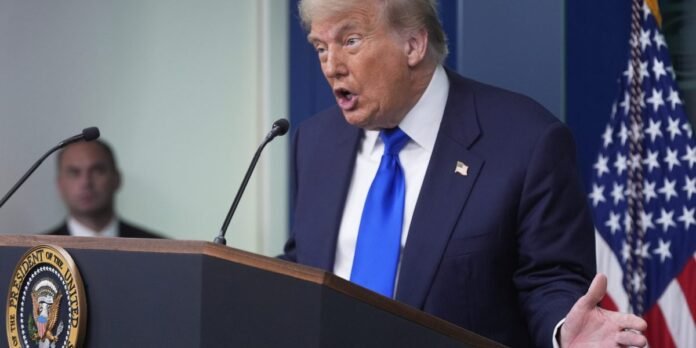President Donald Trump announced on Friday that he is suspending trade talks with Canada due to its plans to proceed with a tax on technology firms, labeling it “a direct and blatant attack on our country.”
In a social media post, Trump stated that Canada had informed the U.S. of its decision to impose the digital services tax, which affects both Canadian and foreign businesses interacting with online users in Canada. This tax is set to take effect on Monday.
“In light of this egregious tax, we are terminating ALL trade discussions with Canada, effective immediately. We will inform Canada of the tariff they will incur to conduct business with the United States within the next seven days,” Trump mentioned in his post.
This announcement marks the latest turn in the trade war initiated since Trump assumed office for a second term in January. Relations with Canada have fluctuated significantly, starting with Trump making remarks about the northern neighbor possibly being integrated as a U.S. state.
Canadian Prime Minister Mark Carney responded by stating that Canada would “continue to conduct these complex negotiations in the best interests of Canadians. It’s a negotiation.”
Later, Trump indicated that he anticipates Canada will retract the tax. “Economically we have such power over Canada. We’d rather not use it,” he declared in the Oval Office. “It’s not going to work out well for Canada. They were foolish to do it.”
When questioned about what Canada could do to revive talks, he suggested removal of the tax, expressing hope that it would be rescinded, but remarked, “It doesn’t matter to me.”
Carney visited Trump at the White House in May, where he was respectful but firm. Recently, Trump attended the G7 summit in Alberta, during which Carney mentioned that trade discussions between Canada and the U.S. had a 30-day deadline.
The digital services tax imposes a 3% charge on revenue from Canadian users on firms such as Amazon, Google, Meta, Uber, and Airbnb. This tax will be applied retroactively, potentially costing U.S. businesses $2 billion by the end of the month.
“We appreciate the Administration’s decisive response to Canada’s discriminatory tax on U.S. digital exports,” stated Matt Schruers, chief executive of the Computer & Communications Industry Association.
The U.S. and Canada have been negotiating to ease a series of steep tariffs imposed by Trump on imports from Canada.
Trump previously conveyed that the U.S. is preparing to send notifications to various countries about the new tariffs his administration plans to impose.
He has enforced 50% tariffs on steel and aluminum and 25% tariffs on automobiles. Additionally, he has levied a 10% tax on imports from most nations, although he might increase rates on July 9, following the 90-day negotiating window he established.
Canada and Mexico are subject to separate tariffs reaching up to 25% instituted by Trump to combat fentanyl smuggling, even though certain products are protected under the 2020 U.S.-Mexico-Canada Agreement signed during Trump’s first term.
After a private meeting with Republican senators on Friday, Treasury Secretary Scott Bessent refrained from commenting on Trump’s decision to halt trade discussions with Canada.
“I was in the meeting,” Bessent stated before moving to the next question.
Around 60% of U.S. crude oil imports come from Canada, along with 85% of U.S. electricity imports.
Additionally, Canada is the largest foreign supplier of steel, aluminum, and uranium to the U.S. and possesses 34 crucial minerals and metals that the Pentagon seeks.
Approximately 80% of Canada’s exports are directed towards the U.S.
Daniel Beland, a political science professor at McGill University, remarked that while it is a domestic tax issue, it has been a long-standing source of tension between Canada and the U.S. because it targets U.S. tech giants.
“The Digital Services Tax Act was signed into law a year ago, so the introduction of this new tax has been well-known for some time,” Beland noted. “However, President Trump chose to create drama over it just before its implementation amidst ongoing and uncertain trade negotiations between the two nations.”






